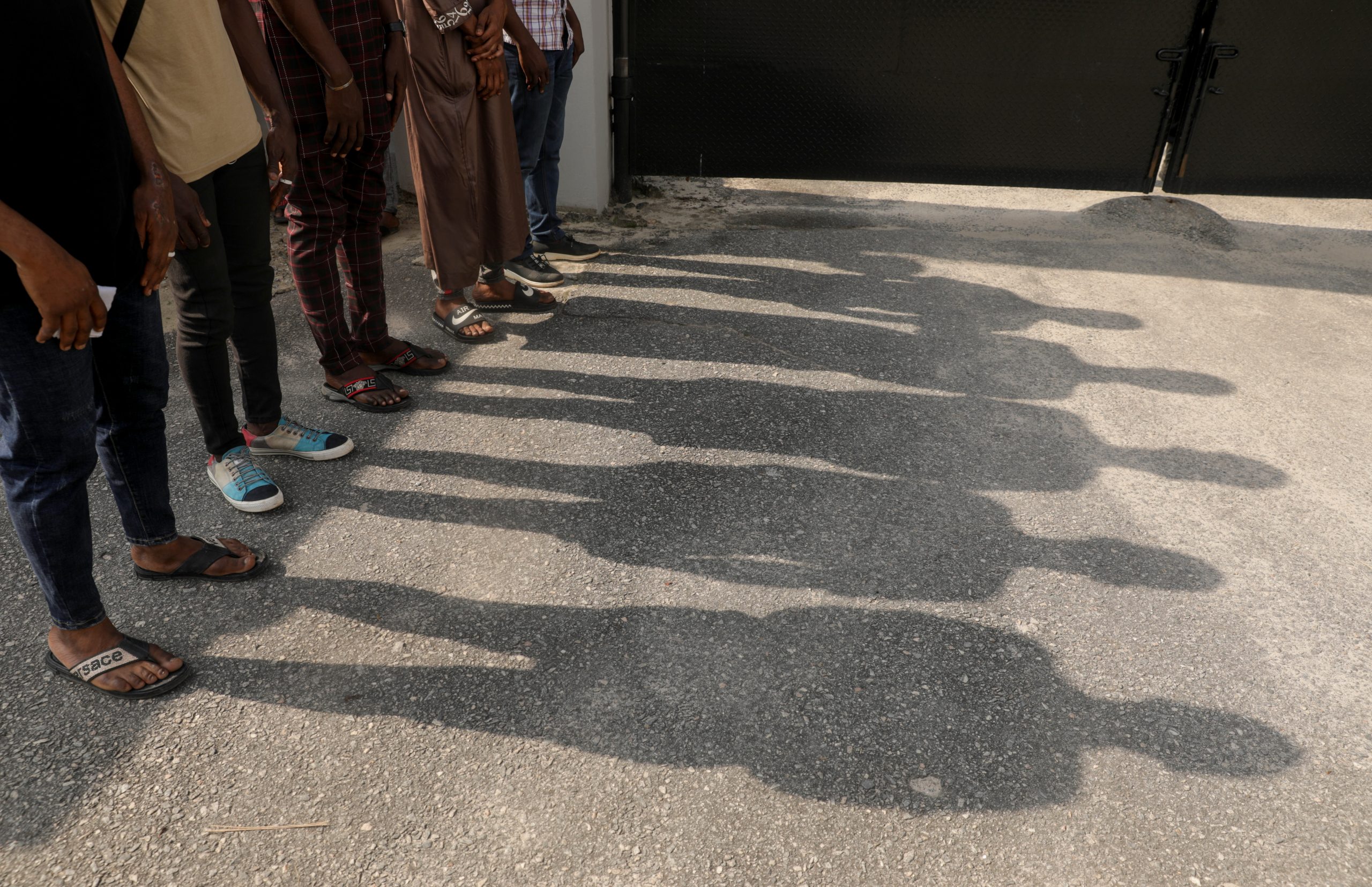© Photo by REUTERS/Temilade Adelaja
TrialWatch, a Clooney Foundation for Justice initiative, through the American Bar Association Center for Human Rights, monitored the trial in Nigeria of 47 men arrested for alleged same-sex relationships at a hotel bar.
The police later asserted that they had been ‘mobilized’ to respond to a ‘gay initiation.’ Although the charges were eventually struck, these men were subjected to discrimination and mistreatment. They were paraded in front of the public (in some cases, forcibly “outing” them). As a result, some lost jobs, another was forced to leave his home because his family told him he had “brought shame on” them, and at least one defendant reported being assaulted. The Fairness Report released today not only confirms the discriminatory nature of the proceedings, but also finds other violations of the men’s rights. These included the use of coercion to obtain confessions and a mass arrest without probable cause. The prosecution also did not disclose its witness list to the defense—and even the two witnesses who did testify had nothing relevant to say.
This prosecution was the first case to be tried under the 2013 Same Sex Marriage Prohibition Act, which criminalizes direct or indirect “public show[s] of same sex amorous relationship[s].” The SSMPA also prohibits marriages and civil unions between persons of the same sex as well as the “[r]egistration of gay clubs, societies and organisations, their sustenance, processions and meetings.” Several provisions of the SSMPA are now before Nigeria’s Federal High Court (a federal appellate court), which will rule on their constitutionality. A decision is expected on November 6.
The Fairness Report, authored by staff at the American Bar Association Center for Human Rights, shows the deep flaws in the SSMPA. The Report finds that the provision of the SSMPA prohibiting ‘same sex displays of affection’ violates the International Covenant on Civil and Political Rights and the African Charter on Human and Peoples’ Rights due to its vagueness. It further concludes that the SSMPA “explicitly discriminates on the basis of sexual orientation,” not only in its provision criminalizing ‘same sex displays of affection,’ but throughout. With the SSMPA now before Nigeria’s Federal High Court, CFJ reiterates that it is past time for this law to go; further, Nigeria must put a stop to discrimination against members of the LGBTQ community in criminal proceedings.
Background
The 47 defendants in this case were among a group of 57 men rounded up and arrested at a hotel without a warrant. They were not informed of the basis for their arrest. It was not until they arrived at a police station that some of them were told they were suspected of being “cultists” (i.e., members of an unlawful society). The morning after the arrests, the police paraded the men during a press conference.
Several defendants alleged that they were mistreated in detention. In particular, a number of the defendants asserted that they were violently coerced into confessing that they were ‘cultists.’ As one explained, after the police threw teargas into the cell where he was being detained, “I was ordered to remove my cloth[e]s and to write another statement admitting that I am a cultist.” Another stated, “I was accused of being a cultist and was ordered to write a statement. When I refused to do so, I was brutalized by the police. I had to tell them what they wanted to hear in order to save myself from further brutalization.”
After the Lagos State Attorney General declined to pursue charges against the men, police prosecutors brought the case to federal court, focusing only on the ‘same sex display of affection’ charge. And yet the charge sheet was cursory: It “contains only the [defendants’] names . . . , the date and location of the alleged offense, and the SSMPA provision under which the defendants were charged. There is no further reference to any individual defendant: the group is charged en masse.”
Over the course of six hearings stretching from December 2019 through October 2020, the prosecution produced no relevant evidence. One police witness testified to little more than his position within the police force. And the only other witness explained that he had been told to “mobilize for an operation related to a ‘gay initiation’ at the [hotel],” but could not identify a single defendant at trial. On five different occasions, the court ordered the prosecution to disclose its full witness list, but it failed to do so.
The Fairness Report, which is based on monitoring of all of the hearings in this case, concludes that:
- “[T]he authorities did not possess a warrant and lacked reasonable suspicion that the accused had perpetrated an offense, rendering the[ir] arrests unlawful – without grounding in domestic legislation – as well as arbitrary.” Further, the Report finds that the defendants’ detention was arbitrary on the ground that it was imposed on the basis of their “actual or imputed sexual orientation.”
- The failure to provide the defendants with the reasons for their arrest “deprived the accused of an opportunity to seek immediate release by explaining the error of the arresting authorities, in violation of both the ICCPR and the African Charter.”
- The charge sheet filed by the federal authorities “falls short of ICCPR and African Charter standards on notification.”
- At least a few of the defendants were subjected to torture, which “appear[ed] to have been ‘intentionally inflicted’ for the purposes of ‘obtaining … information or a confession.’ It also seems that the men were targeted for abuse on the basis of their actual or perceived LGBTQ status.”
- “The prosecution’s prolonged withholding of . . . materials [such as its witness list] violate[d] the accused’s right to adequate facilities in the preparation of a defense.”
For a full legal analysis of the trial and explanation of the grade that has been provided, please see the Fairness Report.
